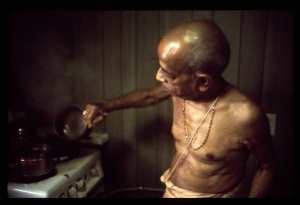SB 1.9.25 (1964)

A.C. Bhaktivedanta Swami Prabhupada
TEXT No. 25
Sri Suta Uvacha Yudhisthiras tad akrnya sayanam sarapanjare Aprichhat bividan dharman rishinam cha anusrinwatam
ENGLISH SYNONYMS
Sri Suta uvach—Sri Suta Goswami said, Yudhisthira—king Yudhisthira. Tad-that, Akarnya—hearing, Sayanam—lying down on, Sarapanjare—on the fabricated-bed of arrows, Aprichhat—asked, Bividhan—multifarious, Dharman—duties, Rishinam—of the rishis Caha—and, Anusrinwatam—hearing after them
TRANSLATION
Suta Goswami said that Maharaj Yudhisthir after hearing Bhismadeva speaking in that appealing tone, enquired from him about the essential principles of various duties in religion in the presence of all the great Rishis (sages) present there.
PURPORT
Bhismadeva speaking in that appealing tone convinced Maharaj Yudhisthir that the great general was very soon passing away. And he was inspired by Lord Sri Krishna to ask him on the principles of religiosity. Lord Sri Krishna inspired Maharaj Yudhisthira to ask Bhismadeva in the presence of many great sages indicating thereby that the Lord's devotee like Bhismadeva although apparently living as a wordly man, is far above the level of many great sages even surpassing Vyasadeva. Another point is that Bhismadeva at that time was not only lying on the death-bed of arrows but also greatly aggrieved on account of that state of his body. One should not have asked him any question for answer at that time but Lord Sri Krishna wanted to prove it that His pure devotees are always sound in body and mind on account of spiritual enlightement and as such at any circumstances a devotee of the Lord is in perfect order for speaking the right ways of life. Yudhisthir also preferred to solve his problematic questions from Bhismadeva than from anyone else who were present there seemingly more learned than Bhismadeva. This is all due to the arrangement of the great wheel-carrier Lord Sri Krishna in order to establish the glories of His devotee as much as the father likes to see the son to become more famous than himself. He declares it very emphitically that worship of His devotee is more valuable than the worship of the Lord Himself.